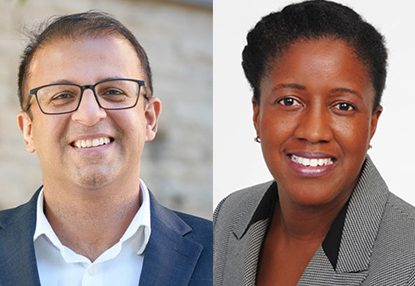Funding: Researchers using modelling techniques to improve pandemic outcomes
By Crystal Mackay
How might COVID-19 policy decisions change based on understanding social determinants of health? How important are community-tailored solutions when making plans for reopening?
These two questions will be addressed by Western University researchers thanks to new funding from the Society for Medical Decision Making (SMDM) as part of the COVID-19 Decision Modeling Initiative. Of the nine projects funded across the globe, two are at Western. The funding supports projects that use decision modelling techniques to aid policy makers and others in decision making roles for better outcomes in the face of the pandemic.
COVID-19 Models and Social Determinants of Health
 Shehzad Ali, PhD, and Ava John-Baptiste, PhD, faculty members at Western’s Schulich School of Medicine & Dentistry, will investigate how mathematical models for informing policy decisions can incorporate the disproportionate impact of COVID-19 on marginalized racial, ethnic and socioeconomic groups, both through unequal health burden and disparity of economic losses.
Shehzad Ali, PhD, and Ava John-Baptiste, PhD, faculty members at Western’s Schulich School of Medicine & Dentistry, will investigate how mathematical models for informing policy decisions can incorporate the disproportionate impact of COVID-19 on marginalized racial, ethnic and socioeconomic groups, both through unequal health burden and disparity of economic losses.
“We are hoping that the project will provide evidence-based recommendations to model and evaluate policy options to mitigate the unequal impact of the pandemic across social groups,” said John-Baptiste, Associate Professor in Epidemiology and Biostatistics.
The research team aims to identify best practices for incorporating considerations for social determinants of health into infectious disease models, as well as developing international guidelines and recommendations on how inequalities can be incorporated into COVID-19 models.
“The outcomes of this project could help prevent the worsening of existing disparities for those most impacted by the COVID-19 pandemic and hopefully lead to better health outcomes during the current and future global crises,” said Ali, Associate Professor in Epidemiology and Biostatistics and Canada Research Chair in Public Health Economics.
Community-tailored Adaptive Strategies for COVID-19
 In a separate project led by Lauren Cipriano, PhD, the main goal is to identify the importance of community-tailored solutions to the COVID-19 pandemic. With an understanding that communities vary in their population density, primary employment sectors, and health care capacity, Cipriano says a community’s risk profile influences the trade-offs between the level of economic and social participation and the COVID-19 morbidity and mortality burden.
In a separate project led by Lauren Cipriano, PhD, the main goal is to identify the importance of community-tailored solutions to the COVID-19 pandemic. With an understanding that communities vary in their population density, primary employment sectors, and health care capacity, Cipriano says a community’s risk profile influences the trade-offs between the level of economic and social participation and the COVID-19 morbidity and mortality burden.
“Our work will highlight how the same set of re-opening policies in one community may yield vastly different outcomes in another community, both in terms of COVID-19 morbidity and mortality as well as value to the community,” said Cipriano, Associate Professor at Ivey Business School and Schulich Medicine & Dentistry. “We hope to spur conversations about how to develop data-driven, community-tailored solutions on how to balance public health and economic goals and prioritize economic, education and social activities that add most value to a community’s economic and social wellbeing.”
Funding for these projects is supported by the Gordon and Betty Moore to Johns Hopkins University to support the work of the Society for Medical Decision Making COVID-19 Decision Modeling Initiative.









